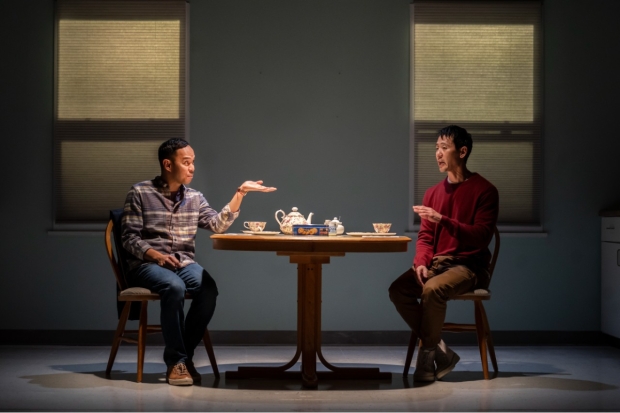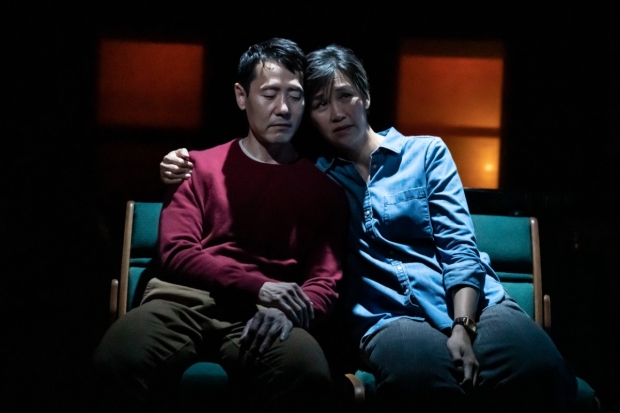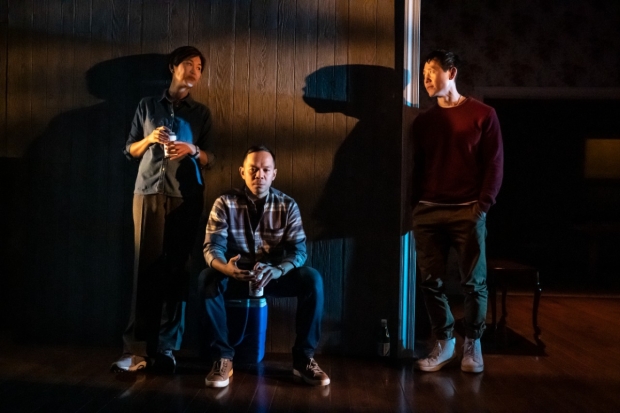Review: In Catch as Catch Can, Family Is a Group Performance

(© Joan Marcus)
Meet Roberta Lavecchia (Jon Norman Schneider) and Theresa Phelan (Rob Yang) — a pair of middle-aged, middle-class, New England mothers who kibbitz over a kitchen table about the latest in the world of the royal family. They scrutinize the gene pool, wonder which "commoner" wife Diana would have preferred, and will the next baby be a beautiful little Princess (enough with the boys already).
Mia Chung opens her play Catch as Catch Can — now at Playwrights Horizons following a successful Page 73 world premiere in 2018 — with this familiar, and seemingly innocuous scene. We shrug, we chuckle, and maybe we even itch to participate in this curious tradition of dissecting the lineage and legacy of a foreign family and all its members — dead, living, and unborn. It hits the ear like idle chatter, but the dark foreground that frames this harshly lit kitchen scene (Marika Kent lights Matt Saunders's spatially effective set) suggests something much eerier than a chin-wag.
You don't need to have Oprah's tell-all with Meghan and Harry memorized to sense the dark undertones of identity, expectation, and, of course, race that simmer beneath the surface of Chung's layered family play that introduces itself disguised as a snappy sitcom. Since its 2018 premiere, double-casting has been part of the play's fabric — an explicit visual depiction of the hazy boundaries between parents and their children, the performative nature of gender roles (costume designer Enver Chakartash dresses all three actors in neutral, masculine-leaning clothing), and the echoes of parental voices speaking through the mouths of their impressionable babes. By casting a trio of Asian actors in this iteration, directed by Daniel Aukin, race now comes to the fore of this meditation on selfhood (the roles were previously performed by three white actors).

(© Joan Marcus)
It's now especially jarring when Schneider and Yang — as Italian and Irish matriarchs Roberta and Theresa — transition from their charming episode of Coffee Talk with Linda Richman to a swapping of thinly veiled (or totally unveiled) insults targeting their respective sons' East Asian significant others. Roberta's son Robbie, also played by Schneider, recently divorced a Korean woman, while Theresa's son Tim, also played by Yang, announced his engagement to a woman named Mingjung. And then there's Daniela Lavecchia (played by Cindy Cheung, doubling as Daniela and Robbie's taciturn father Lon), who demonstrates the tradition that knows no cultural boundaries — a daughter's coercion to accept any marriage proposal that comes her way (you can't argue with your biological clock…or an Italian mother).
As you might have predicted, expectations set by culture, gender, and that ethereal concept of "whiteness" (a particularly knotty concept for Italian and Irish Americans) are left unfulfilled by the younger generation, leaving everyone in the Lavecchia and Phelan families feeling lost at sea (Cheung and Yang have some beautiful featured moments as their younger characters). It's a rife dynamic to explore, and one to which Chung brings intriguing theatrical modes of exploration. And yet, her theatrical devices — despite their grand promises of revelation — never quite live up to their potential.
Scenes often feel flabby, with insubstantial dialogue left in exclusively (it seems) for entertainment's sake (Schneider does make an excellent Italian mother but there's only so much frantic Christmas party set-up we need to witness firsthand). The performers similarly showcase immense skill in their quick transitions between characters, but moments for Aukin to highlight the deeper meaning behind these shifts in identity are left on the table (that Aukin trusts his audience to follow these logistically complex scenes, however, is greatly appreciated). Only in one of the play's final scenes, in which Robbie and Tim jokingly imitate their mothers — a time-honored tradition between parents and adult children — do Chung's intended insights go from intellectual to visceral. If Catch as Catch Can does its job, you'll walk away wondering how often the words that come out of your mouth are actually spoken by another voice.

(© Joan Marcus)











